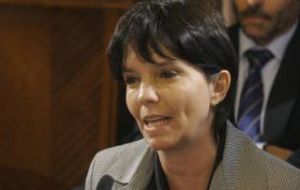MercoPress. South Atlantic News Agency
Argentine central bank confirms pro-active policies and competitive Peso
 Marcó del Pont said ‘zero deficit’ recommendations are an ‘example of failure’ in Argentina
Marcó del Pont said ‘zero deficit’ recommendations are an ‘example of failure’ in Argentina Argentine Central Bank Governor Mercedes Marcó del Pont assured on Wednesday that the flight of dollar deposits from the local financial system has slowed down and highlighted the fact that Government’s policy of regulated exchange rate has given “certainty” to savers and investors. She also forecasted 6% growth next year for the Argentine economy.
While speaking at a seminar organized by the Economy Ministry and the World Bank, Marcó del Pont spoke of her meeting with Noble Prize winner Joseph Stiglizt and other WB officials.
“Despite the experts attending, the final result of the meeting leaves a sceptic climate, because now they speak of fiscal consolidation, but the recommendations are the usual and do not aim at development and growth, such as deficit zero,” she said while analyzing the European crisis.
Later in her speech, the CB governor mentioned Argentina “as an example of the failure” of those (fiscal consolidation) policies and suggested that that bad example is taken into account. “Experts vindicate the strength of the Argentine model on grounds of a solid domestic market, industrialization and a diversification in exports that allows us to predict a 6% GDP expansion”.
Marcó del Pont also stressed the importance of the continuity of the economic policies in President Cristina Fernández second term, which begins officially on Saturday. “When we speak about the new Cabinet what comes across is the continuity of the regime, which has been absolutely successful. Within this regime, the policy of a regulated floating exchange rate has certainly proved its success,” she said.
“This policy not only provides a competitive exchange rate but has also allowed us to guarantee certainty regarding the evolution of the US dollar, vanishing old (instability) phantoms of our financial and monetary history”, added the Central bank president.
When asked about capital flight following the implementation of strict controls over the sale and purchase of foreign currency Marcó del Pont said that the “graph is of dollar deposits is converging to zero” and in some banks “we have seen a return of some of those deposits”.
Furthermore the banker said that the issue must be analyzed in its real dimension since in the nineties deposits in US dollars were 50/60% of the total, according to the year, and were the natural financing and credit sources of Argentina.
“This is another model, deposits in dollars represent 14% of all deposits and financing in Argentina is basically done in Pesos. This gives us an enormous capacity to address international turbulences”.
Marcó del Pont who has been confirmed in the Central Bank for the second mandate of President Cristina Fernandez was the official anchor woman for the main conference from Nobel Prize Stiglitz on theory and practice of countries’ debt restructuring.




Top Comments
Disclaimer & comment rules-

-

-

Read all commentsI wonder what economic instrument Mercedes has created to assure capital flow. lets never forget that a healthy economy needs capital flow. the housing industry could hardly provide the capital flow a country needs for long term projects. 5 and 10 year bonds use to serve this purpose, here is we can find a good example of this bonds.
Dec 08th, 2011 - 10:04 am 0DIASPORA BONDS: TAPPING THE DIASPORA
DURING DIFFICULT TIMES
SUHAS L. KETKAR
Vanderbilt University
DILIP RATHA*
The World Bank, 1818 H Street NW
Washington, DC
dratha@worldbank.org
“India and Israel have raised over US$35 billion by tapping into the wealth of their diaspora communities. These diaspora bonds represent a stable and cheap source of external finance, often when countries lost access to international capital markets.”
www.siteresources.worldbank.org/TOPICS/Resources/214970-1288877981391/Ketkar-Ratha.pdf
I am concerned at the statements made here and how to resolve them against the reported facts.
Dec 08th, 2011 - 11:09 am 0Is she saying the bank wants to deal in Pesos with the international community?
The 'model' allows for a 6% GDP expansion. Really? Is this in USD terms or Pesos? In USD terms that means the 7.1% devaluation results in a 1.1% real contraction. In Pesos terms, just pick a number between 25 - 35%.
Incredible.
PolispeaK, competitive peso =(further) devaluation. If they are publicly saying monetary flight has abated it must be doing the exact opposite.
Dec 08th, 2011 - 12:02 pm 0Like a teenager with their parents credit card eventually the bill comes.
Commenting for this story is now closed.
If you have a Facebook account, become a fan and comment on our Facebook Page!